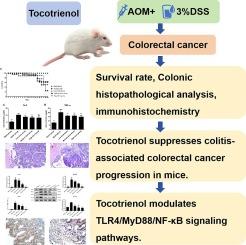生育三烯酚在小鼠结直肠癌模型中通过 TLR4 信号传导抑制结肠炎相关癌症进展
IF 2.9
Q2 TOXICOLOGY
引用次数: 0
摘要
本研究旨在评估生育三烯酚在抑制核因子-卡巴B(NF-κB)介导的结直肠癌炎症通路方面的预防功效。我们利用偶氮甲烷(AOM)和右旋糖酐硫酸钠盐(DSS)诱导结肠炎相关性结直肠癌(CAC)小鼠模型。在制作 CAC 模型时,小鼠腹腔注射浓度为 10 毫克/千克体重的 AOM。注射 AOM 七天后,小鼠饮用含 3% DSS 的水一周,然后再饮用普通水两周。这一DSS处理周期(1周3% DSS+2周水)又重复了两个周期。小鼠被随机分为五组(n = 20/组),包括空白组、模型组、三个不同剂量的生育三烯酚组(低剂量组[50 mg/kg]、中剂量组[75 mg/kg]和高剂量组[100 mg/kg])。采用组织学、流式细胞术、Western 印迹和小鼠 Luminex 检测法评估生育三烯酚的保护作用。与空白组相比,模型组的toll样受体4(TLR4)、髓样分化蛋白88(MyD88)、肿瘤坏死因子受体相关因子6(TRAF-6)、NF-κB、白细胞介素(IL)-6和肿瘤坏死因子(TNF)-α的表达量增加,而IL-4和IL-10的表达量减少(P<0.05)。与模型组相比,生育三烯酚可预防癌变,并降低 IL-6、TNF-α、MyD88、TLR4、TRAF-6 和 NF-κB 的表达水平(P<0.05)。与模型组相比,中剂量组和高剂量组的 IL-10 表达量增加(P<0.05)。生育三烯酚的保护作用可能与抑制 TLR4 /MyD88 /NF-κB 介导的炎症信号通路有关。因此,使用生育三烯酚可以改善结直肠癌小鼠模型中细胞因子的异常表达,抑制结直肠癌的发生和发展。本文章由计算机程序翻译,如有差异,请以英文原文为准。

Tocotrienol suppresses colitis-associated cancer progression through TLR4 signaling in a mouse model of colorectal cancer
This study aimed to evaluate the preventive efficacy of tocotrienol in inhibiting the nuclear factor-kappa B (NF-κB) mediated inflammation pathways in colorectal cancer. We utilized the azoxymethane (AOM) and dextran sulfate sodium salt (DSS) to induce colitis-associated colorectal cancer (CAC) mice model. In generating a CAC model, mice were intraperitoneally injected with AOM at a concentration of 10 mg/kg body weight. Seven days after the AOM injection, mice drinking water containing 3 % DSS for 1 week, followed by a 2-week period of regular water. This cycle of DSS treatment (1-week 3 % DSS+2-week water) was repeated for two additional cycles. Mice were randomly divided into five groups (n = 20/group), including Blank group, Model group, three different dosages tocotrienol groups (Low dose group [50 mg/kg], Medium dose group [75 mg/kg], and High dose group [100 mg/kg]). The protective effects of tocotrienol were assessed using histological, flow cytometry, western blot and mouse Luminex assay. Compared with the blank group, expressions of toll-like receptor 4 (TLR4), myeloid differentiation protein 88 (MyD88), tumor necrosis factor receptor-associated factor 6 (TRAF-6), NF-κB, Interleukin (IL)-6 and tumor necrosis factor (TNF) −α were increased in model group, while IL-4 and IL-10 were decreased in model group (P<0.05). Tocotrienol prevented carcinogenesis and decreased the IL-6, TNF-α, MyD88, TLR4, TRAF-6 and NF-κB expression levels, compared with the model group (P<0.05). Compared with the model group, the expression of IL-10 was increased in medium dose group and high dose group (P<0.05). The protective effects of tocotrienol may be related to the inhibition of TLR4 /MyD88 /NF-κB mediated inflammatory signaling pathways. Therefore, the use of tocotrienol can improve the abnormal expression of cytokines in a mouse model of colorectal cancer and inhibit the occurrence and development of colorectal cancer.
求助全文
通过发布文献求助,成功后即可免费获取论文全文。
去求助
来源期刊

Current Research in Toxicology
Environmental Science-Health, Toxicology and Mutagenesis
CiteScore
4.70
自引率
3.00%
发文量
33
审稿时长
82 days
 求助内容:
求助内容: 应助结果提醒方式:
应助结果提醒方式:


